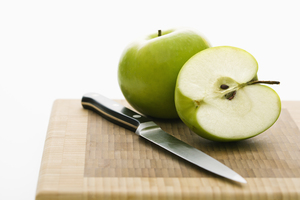 By Cliff Smith
By Cliff Smith
Have you had any whole foods today? Were they raw, or steamed, or baked at low enough temperatures to maintain the whole food structure? If your food choices were fried, microwaved, heated over 118 degrees, or altered in processing and packaging, then most likely they were not whole foods when you ate them.
The term 'whole foods' refers to specific foods found in nature that include all the necessary nutrients for humans - carbohydrates, fat, protein, vitamins and minerals, without alteration. Whole foods do not contain added ingredients such as synthetic or isolated vitamins, artificial flavorings, sugars, salt, or trans-fats. Those that are not whole foods may have also been deprived of part of their nutritional value through cooking or refining processes. Some obvious, non-whole foods usually include ingredients like white flour, refined sugars, and  hydrogenated oils. Other, less obvious selections are over-cooked vegetables, fruit juices that have been pasteurized, and breads made with refined flours.
hydrogenated oils. Other, less obvious selections are over-cooked vegetables, fruit juices that have been pasteurized, and breads made with refined flours.
Examples of whole foods include raw fruits and vegetables like lettuce, spinach, apples, berries and bananas, along with legumes, nuts and whole grains. A significant nutrition fact to keep in mind is that whole foods are usually in their raw state, or are cooked at temperatures below 118 degrees. Once they have been boiled, pasteurized or heated to excess, whole foods lose some of their nutrients.
 To survive and thrive, the human body needs complex carbohydrates, fat, protein, vitamins, minerals, and fiber. All of these essential elements are abundant and easy to assimilate in whole foods. Studies have proven that the human body does indeed function better when about two-thirds of the diet consists of whole foods. Compared with processed foods, which are usually high in simple carbs, whole foods contain more complex carbohydrates. This supports natural weight loss as complex carbohydrates take longer to digest and can reduce hunger. Also, whole foods are rich in bioflavonoids and phytochemicals—powerful nutrients found in plants.
To survive and thrive, the human body needs complex carbohydrates, fat, protein, vitamins, minerals, and fiber. All of these essential elements are abundant and easy to assimilate in whole foods. Studies have proven that the human body does indeed function better when about two-thirds of the diet consists of whole foods. Compared with processed foods, which are usually high in simple carbs, whole foods contain more complex carbohydrates. This supports natural weight loss as complex carbohydrates take longer to digest and can reduce hunger. Also, whole foods are rich in bioflavonoids and phytochemicals—powerful nutrients found in plants.
 Nutrients in whole foods work in harmony with each other and with the body’s systems to keep everything functioning properly. This is why whole foods are among the best guardians against illness. Their ability to decelerate digestion allows for greater absorption of nutrients. This can create positive changes within the intestinal tract for healthy probiotic bacteria production, which can lead to a stronger immune system. Some whole foods also contain beneficial phytochemicals, which are known to fight free-radicals and break down carcinogens.
Nutrients in whole foods work in harmony with each other and with the body’s systems to keep everything functioning properly. This is why whole foods are among the best guardians against illness. Their ability to decelerate digestion allows for greater absorption of nutrients. This can create positive changes within the intestinal tract for healthy probiotic bacteria production, which can lead to a stronger immune system. Some whole foods also contain beneficial phytochemicals, which are known to fight free-radicals and break down carcinogens.
Many people have a hard time filling their daily diets with enough whole foods to make a positive difference in their health. This is why today’s whole food concentrates are so beneficial, especially for busy, active people who don’t always eat enough whole foods. There are some outstanding pre-packaged, whole food concentrates that have been prepared with minimal processing and at lower temperatures for perfectly convenient consumption. These provide an easy solution for obtaining valuable whole foods each day in order to achieve optimal health and wellness.








